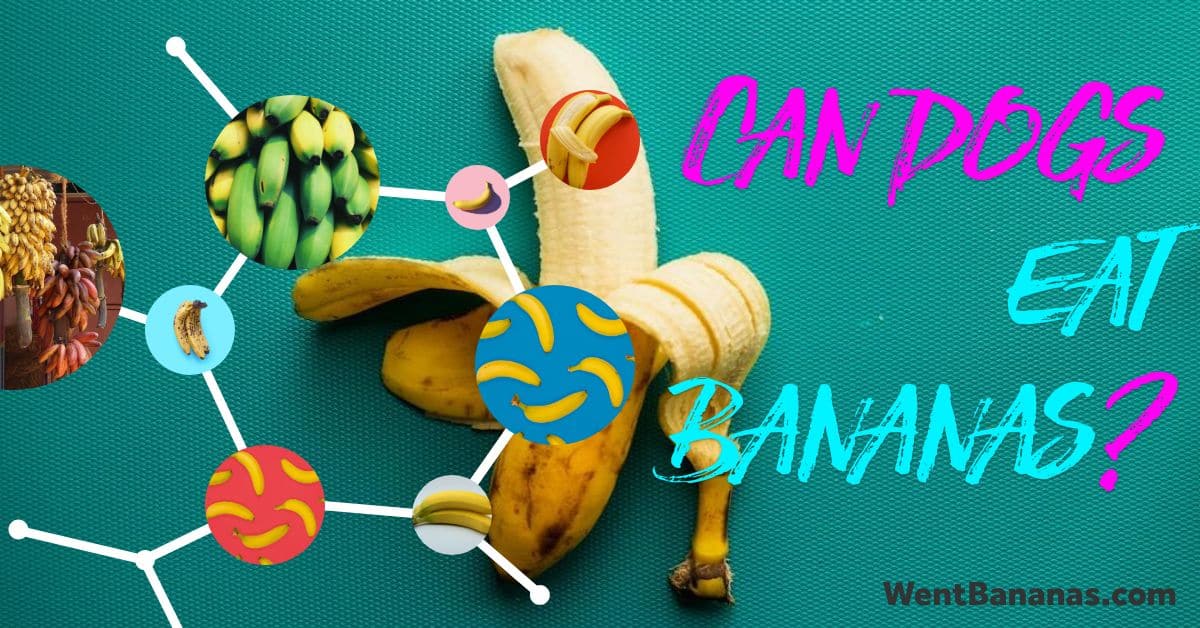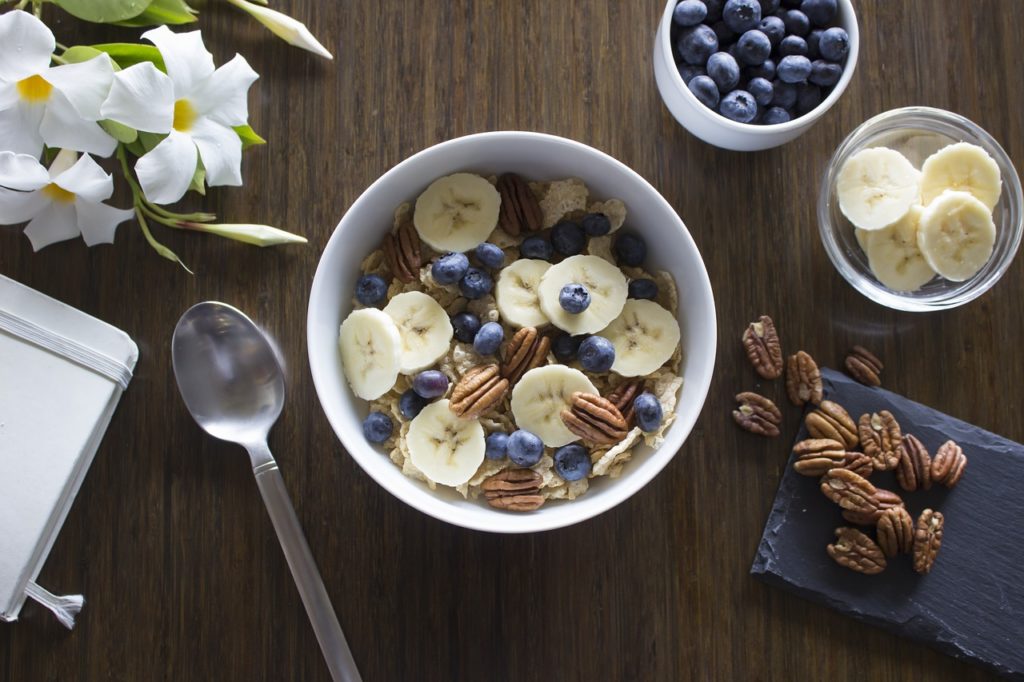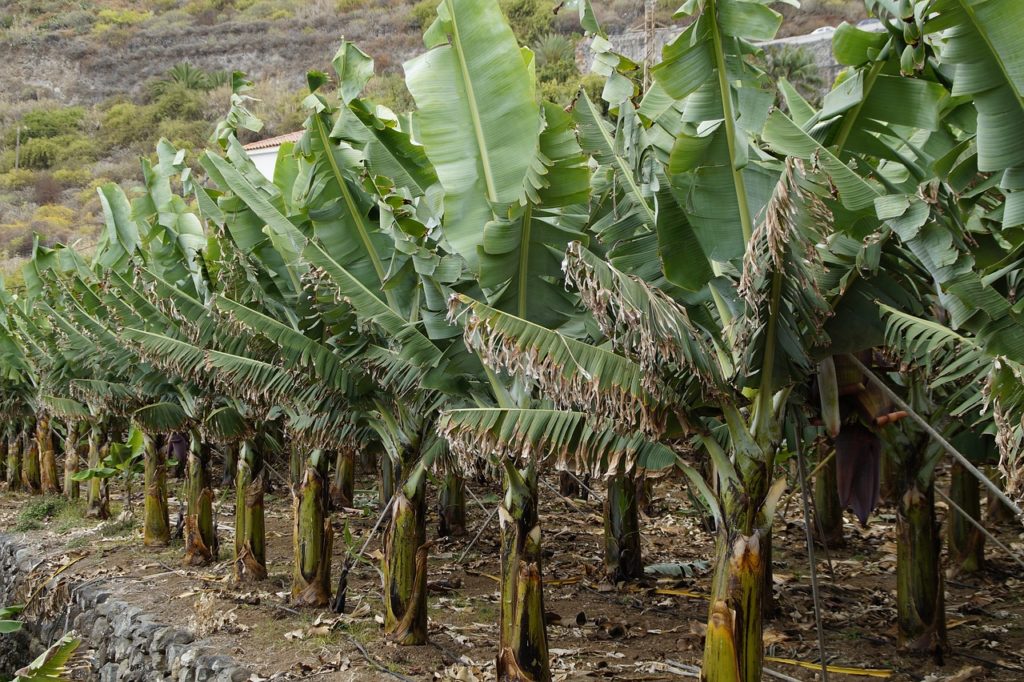You may have heard that bananas are a healthy treat for canines, but can dogs eat bananas safely?

It is important to consider this question carefully before offering your pup a tasty snack. This article provides a comprehensive overview of everything you need to know about bananas and dogs- what they are, their nutritional benefits, potential dangers, and tips for incorporating them into your canine companion’s diet.
If you’re looking for an answer to the question, “Can dogs eat bananas?”, then read on to discover the answer and more.
What Is a Banana?

A banana is an edible, starchy fruit produced by an herbaceous perennial plant of the genus Musa. The yellowish-green skinned fruits are botanically classified as a berry due to their swollen and fleshy pericarp, which contains numerous seeds.
Bananas come in various sizes and colors when ripe such as yellow or black; they can be eaten raw or cooked. Additionally, they provide many essential vitamins and minerals that benefit human health including vitamin B6, manganese, dietary fiber, potassium, and magnesium
Can Dogs Eat Bananas Safely?
Canines have the potential to safely consume bananas with no negative repercussions. However, it is important for pet owners to be aware of their dog’s digestive system and any food allergies before introducing a new item into their diet.
Bananas are rich in nutrients such as Vitamin B6, Vitamin C, Potassium, Magnesium, and Folate which all support canine health when consumed in moderation.
While some dogs may require more protein than what can be found in this fruit, adding small amounts of banana into an otherwise balanced diet can provide them with essential vitamins and minerals that they need while still following dietary requirements set by veterinarians or specialists.
In addition to the nutritional benefits that come from eating bananas on occasion, these fruits contain high levels of natural sugar which will help satiate sweet cravings without causing harm or weight gain if given once per week or less frequently.
The act of chewing also helps keep teeth clean so it is considered safe for canines who lack access to regular dental hygiene sessions (such as brushing).
The Nutritional Benefits of Feeding Your Dog Bananas.
A banana is a nutritious and delicious fruit that can be enjoyed by both humans and their canine companions alike. In addition to its high fiber content, bananas provide essential vitamins, minerals, and antioxidants that help support overall dog health.
Feeding your pup bananas has numerous nutritional benefits as it aids digestion with its natural prebiotic properties while also providing energy-dense carbohydrates for sustained activity.
Furthermore, the potassium found in this tropical delight helps regulate blood pressure levels while supporting healthy skin & coat development due to the vitamin C content within it.

Overall, feeding your furry friend a banana offers tons of nutrition without any unnecessary additives or unhealthy fats – making it an ideal snack for pooches of all sizes!
Potential Dangers of Feeding Your Dog Bananas in Excess.
Feeding your dog bananas in excess can have serious consequences, and it’s important to be aware of the potential dangers. While a banana is not necessarily toxic for your canine companion, there are several factors that should be taken into consideration when determining safe levels of ingestion.
Too much potassium contained in the fruit can lead to hyperkalemia for dogs, especially if their diet isn’t balanced with other sources of nutrition as well. The sugar content in bananas may also contribute to obesity or dental problems if eaten excessively over time – both of which could eventually impact the quality of life and overall health.
Additionally, eating an indigestible banana peel poses a risk of intestinal blockage due to its tough texture; however this doesn’t mean you need to worry about feeding one slice here or there!
Ultimately it’s best practice to consult with a veterinarian before making any dietary changes but avoiding excess consumption is key when offering treats like bananas so that they don’t cause more harm than good!
Tips for Incorporating Bananas into Your Dog’s Diet Safely and Effectively
Bananas can make a delicious and nutritious addition to your canine companion’s diet. However, it is important to do so in a safe and effective manner. Here are some tips for incorporating bananas into your dog’s diet safely and effectively:

- Feeding bananas should be done under supervision: Bananas should always be fed as treats or snacks rather than meals unless instructed by a veterinarian. Dogs that over-indulge on ripe bananas may experience indigestion or diarrhea due to their high sugar content, so feed them in moderation.
- Choose only fresh bananas: Ripe but fresh fruit will provide the most nutritious benefits for your pup; select ones that have no blemishes or bruising. Avoid feeding overly green or brownish-black fruits as these could cause gastrointestinal upset if unripe enough when eaten raw by dogs with sensitive stomachs. Additionally, avoid using canned banana products because they lack many of the essential vitamins found in whole foods like fiber and manganese which are beneficial for digestion while providing energy throughout the day!
- Monitor closely at first introduction: Introducing new food items into any pet’s regular routine requires close monitoring at first until you’re sure how he reacts both physically and behaviorally–especially since different pets react differently even within breed type/age groupings! If you notice any signs of digestive distress—including vomiting, loose stools/diarrhea—
Our Final Thoughts
« The Rejuvenating Benefits of Eating Bananas Every Day
Do Bananas Cause Constipation? »
In conclusion, you can safely feed your dog bananas in moderation as part of their overall diet. Bananas are a safe and nutritious treat for dogs, providing essential vitamins and minerals.
If you choose to give your four-legged friend the occasional banana snack or meal supplement, be sure to watch how they react and exercise caution when introducing any new food into your pup’s diet!
















